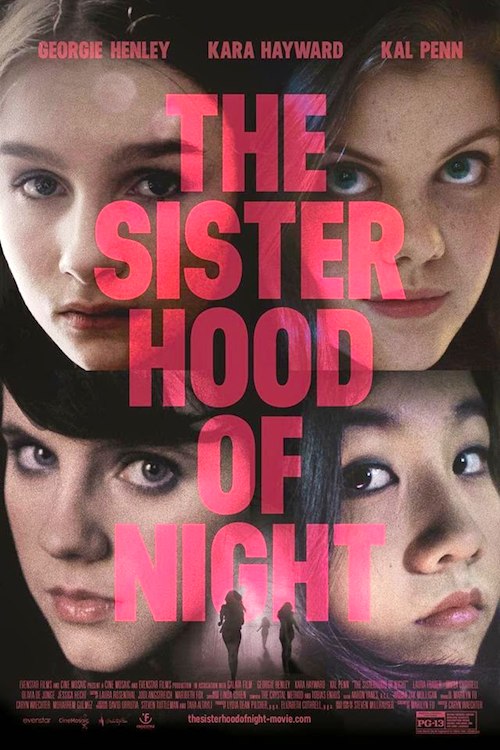By Joe Bendel. Their parents ought to be thrilled when five teenage girls swear off Facebook and social networking, but they react with the same suspicion and paranoia that sweeps through their Hudson Valley hamlet. For reasons only they understand, the girls refuse to explain themselves, leaving a void to be filled by the worst high school and the digital era have to offer. The Salem witch hysteria is revisited through the contemporary lens of cyber-stalking and conventional school bullying in Caryn Waechter’s The Sisterhood of Night, which opens this Friday in New York.
In retrospect, the pentagram-like insignia of the so-called Sisterhood of the Night was probably a mistake. It just makes it too easy for those so inclined to suggest they are some kind of satanic cult. Emily Parris will be their first accuser. She always yearned for social acceptance and envied Mary Warren’s outsider coolness. Unfortunately, when Warren starts recruiting members for her secret society, she decidedly passes over the desperate Parris. Instead, she picks unlikely candidates like Catherine Huang and Lavinia Hall.
 Although the Sisterhood guards its secrets from the audience nearly as long as it does from the easily manipulated citizens of Kingston, New York, it seems obvious right from the start they are merely engaged in some ritualized forms of female bonding. Yet again, their midnight initiation ceremonies in the woods are ripe for willful misinterpretation. Hence, when Warren catches Parris enviously spying on them, the shunned teen starts making wild accusations online. Her blog quickly picks up followers, as she becomes a media sensation. Unfortunately, the story soon snowballs out of control, especially when other students start escalating the situation for their own amusement. Although their painfully slow-on-the-uptake counselor Gordy Gambhir tries to get them to explain themselves, the Sisterhood clings to their silence.
Although the Sisterhood guards its secrets from the audience nearly as long as it does from the easily manipulated citizens of Kingston, New York, it seems obvious right from the start they are merely engaged in some ritualized forms of female bonding. Yet again, their midnight initiation ceremonies in the woods are ripe for willful misinterpretation. Hence, when Warren catches Parris enviously spying on them, the shunned teen starts making wild accusations online. Her blog quickly picks up followers, as she becomes a media sensation. Unfortunately, the story soon snowballs out of control, especially when other students start escalating the situation for their own amusement. Although their painfully slow-on-the-uptake counselor Gordy Gambhir tries to get them to explain themselves, the Sisterhood clings to their silence.
Granted, Sisterhood is far from perfect. Waechter’s execution has its share of tonal issues, including a bizarrely upbeat ending that seems more appropriate for an Up with People production. The periodic if-I-had-only-known narration from Gambhir and Lavinia’s mother Rose is often beyond heavy-handed. Yet, somehow none of that fatally detracts from the totality of the film. For the most part, screenwriter Marilyn Fu’s adaptation of Steven Millhauser’s short story is mysteriously allegorical, while evoking a sense it is based on very real incidents. It captures the madness of the media feeding frenzy, which has only been intensified by the internet, as well as timeless crumminess of peer pressure and teen alienation.
The young ensemble is also quite remarkable, starting with Narnia’s Georgie Henley, who is both fiercely intimidating and nakedly vulnerable as Warren. Yet, Willa Cuthrell is even more poignant, depicting Huang’s desperately confused responses to her family crisis. It is downright painful watching Kara Hayward’s Parris trying too hard, but in a way that is all too believable. Unfortunately, former Obama administration stone-waller Kal Penn is embarrassingly awkward as Gambhir, the wannabe cool hipster. Can’t we just send him back to White Castle?
Despite its zeitgeisty elements, Sisterhood taps into some deep archetypes. There is something powerfully unsettling about its vision of human natures, regardless of its closing musical flag-waving number. Recommended warts-and-all as a cautionary fable, The Sisterhood of Night opens this Friday (4/10) in New York, at the AMC Empire.
LFM GRADE: B
Posted on April 8th, 2015 at 10:11pm.